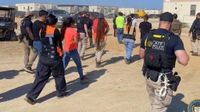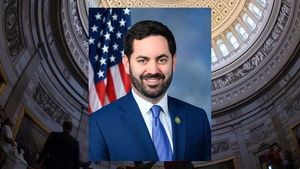Communities throughout the Chicago area braced for a surge in immigration enforcement operations as federal authorities launched a coordinated effort beginning Saturday, September 6, 2025. The move comes amid a wave of high-profile Immigration and Customs Enforcement (ICE) raids sweeping the nation, with hundreds of undocumented immigrants apprehended in a single day across states ranging from Georgia to New York, according to reporting by Kaitlyn Dang for National News.
The logistical heart of the Chicago-area operation is North Chicago’s Naval Station Great Lakes, where approximately 300 federal agents have established a temporary hub. According to WLS, the Navy agreed to provide office space and parking for ICE and Department of Homeland Security (DHS) officials from September 5 through October 5, 2025, but drew a firm line: no barracks or housing would be made available, and lethal munitions would not be permitted on base. This arrangement followed a direct request from federal authorities, but the Navy’s restrictions underscored sensitivities around the military’s role in domestic law enforcement.
Illinois Senators Dick Durbin and Tammy Duckworth, along with Congressman Brad Schneider, visited the naval base on Friday, September 5, seeking clarity on the scope and intent of the operation. The lawmakers reported that while the Navy was responsive about the logistical arrangements, they were unable to speak directly with DHS officials present at the base. Their efforts reflected a broader concern among local leaders about transparency and the potential impact on Chicago’s communities.
Outside the now-boarded up Broadview ICE facility, demonstrators gathered in anticipation of the coming crackdown. WLS reported that this facility is expected to serve as a processing center for daily operations over the next month and a half. The visible presence of protesters was a stark reminder of the tension and anxiety gripping immigrant communities across the region.
President Donald Trump, commenting on the nationwide surge in enforcement, emphasized that the primary goal was to remove dangerous criminals from the streets. "This surge in immigration enforcement activity in the Chicago area is about getting dangerous criminals off the streets," Trump stated, as cited by WLS. The administration’s messaging has focused on public safety, but critics argue that such broad sweeps often ensnare individuals whose only offense is lacking legal status.
The impact of the enforcement push has rippled through local communities and cultural events. In Wauconda, organizers made the difficult decision to cancel the annual Latin Heritage Fest, citing safety as their paramount concern. "We know how meaningful the event is for the community, but safety needs to come first," organizers explained, according to WLS. Meanwhile, Aurora’s Fiestas Patrias celebration pressed on as scheduled for the weekend of September 6–7, with the city’s special events team working in close coordination with public safety departments to ensure the event remained secure for all attendees.
In Chicago’s Little Village neighborhood—a vibrant hub for the city’s Mexican-American community—leaders urged residents to continue living their lives, but to make contingency plans in light of the heightened enforcement. The neighborhood’s signature Mexican Independence Parade, a cherished tradition, remains set for the weekend of September 13–14. Community organizers expressed determination not to let fear disrupt their cultural celebrations, yet acknowledged the need for vigilance.
Chicago Public Schools (CPS) educators have mobilized in response to the anticipated ICE operations. Teachers across the city have been distributing "defend your rights" flyers to students and families, aiming to inform them of their legal protections and how to respond if confronted by immigration authorities. The Chicago Teachers Union announced plans to activate special teams to maintain a watchful presence around schools during the enforcement period. Their goal: to provide reassurance and practical support to students who may be feeling vulnerable.
Elsewhere, the effects of the nationwide ICE operations have been felt acutely. National News reported that on September 6, hundreds of undocumented immigrants were apprehended in massive workplace raids, with coordinated actions taking place from Georgia to New York. The timing of these raids, coinciding with the ramp-up in Chicago, has heightened anxiety among immigrant communities and drawn scrutiny from advocacy groups and elected officials.
For local governments and event organizers, the challenge has been to balance public safety with the need to maintain community cohesion and trust. In Aurora, the city’s special events team emphasized its commitment to ensuring that Fiestas Patrias would proceed safely, working closely with law enforcement and community leaders. In Little Village, parade organizers have doubled down on outreach and contingency planning, determined to keep the spirit of celebration alive despite the uncertain climate.
The decision by the Navy to limit its support to office space and parking—explicitly excluding barracks, housing, and the storage of lethal munitions—reflects a careful navigation of legal and ethical boundaries. As reported by WLS, the Navy’s stance has been to cooperate with federal authorities within strict parameters, mindful of the sensitivities involved in hosting immigration enforcement operations on a military base.
For many residents, the coming weeks are fraught with uncertainty. Community leaders and educators have moved quickly to distribute information and resources, urging families to know their rights and make plans. The presence of demonstrators outside the Broadview ICE facility, even before the operations began in earnest, signals the deep concern and resistance among those who fear the raids will tear families apart or sow distrust between law enforcement and the communities they serve.
As the enforcement effort unfolds, the eyes of the nation will remain fixed on Chicago and other cities targeted in the latest round of ICE operations. The outcome will likely shape not only the immediate lives of those directly affected, but also the broader debate over immigration policy, public safety, and the role of federal agencies in local communities.
In the meantime, Chicago’s neighborhoods are doing what they have always done in times of challenge: organizing, supporting one another, and refusing to let fear define their future. Whether through the cancellation of cherished festivals, the steadfast continuation of parades, or the quiet distribution of know-your-rights flyers, the city’s response has been as varied as its people—resilient, resourceful, and, above all, determined to endure.




